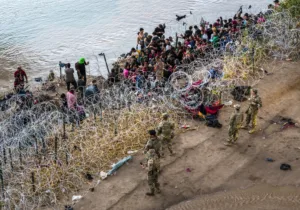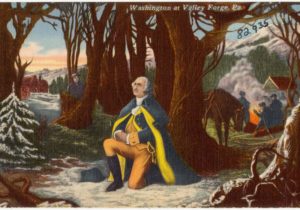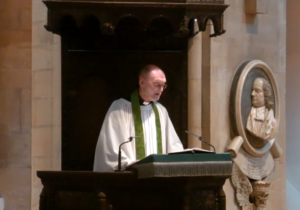Amid debate and the ongoing federal government partial shutdown over funding for border security and wall construction, two very different pastors offered two very different visions of what the Bible says about building walls.
Dallas pastor Robert Jeffress, an outspoken Trump supporter, told Fox News that God approves of walls, recalling Old Testament Nehemiah’s admonition for Jerusalem’s walls to be rebuilt.
“It’s absolutely absurd…the Bible teaches that the primary responsibility to government is to maintain order and keep its citizens safe,” Jeffress said. “The Bible says even Heaven itself is going to have a wall around it,” apparently citing the New Jerusalem of Revelation, with its lustrous 75 yard high edifice of jasper and other jewels. “Not everybody is going to be allowed in.”
“So if walls are immoral, then God is immoral,” Jeffress surmised. “There is nothing immoral about a wall but what is immoral is for Democrats for political reason to block the president from fulfilling his God-given responsibility to keep our country safe and it’s certainly immoral for Democrats to support sanctuary cities which are nothing but havens of lawlessness.”
Missouri pacifist pastor and author Brian Zahnd responded to Jeffress via Twitter:
The New Jerusalem has twelve gates—gates that will never be shut. Furthermore, the Spirit and the Bride say, “Come!”—inviting all who are willing to enter the City of the Lamb. It’s hell that has a great gulf fixed preventing anyone from crossing over from the other side.
When challenged about American sovereignty, Zahnd retorted: “How sovereign is a nation if we confess that Jesus is Lord?” He, like many clergy on the Evangelical Left, believes Christians are called only to universality and have no calling in what he and many others commonly deride as “empire.”
Here are very different theological and political imagery. One pastor sees an America protected, metaphorically, by 75 yard high bejeweled walls defending God’s saints from demons and the damned. The other sees America, metaphorically, as a beacon of endless hospitality whose gleaming gates are always open. Its welcome contrasts with hell, which permits no migration to and fro.
Of course, America is not the New Jerusalem with which God consummates His Kingdom on earth, as both Jeffress and Zahnd know. But to what extent are the heavenly city’s fortifications instructive for America or for any earthly nation?
New Jerusalem’s impregnable walls, guarded by angels, symbolize God’s unassailable safety, reliability and holiness. All who accept His invitation to salvation are welcome to enter through the mighty gates that never close. Nations of the redeemed flow through those gates. But no abomination or falsehood is ever permitted to enter. The walls and their protective angels demarcate what is divine pleasure versus what is divine curse.
So the walls of New Jerusalem don’t quite fit the analogy summoned by either Pastor Jeffress or Pastor Zahnd. All have been invited to the Heavenly City, but only according to God’s terms, not by intrinsic right. Defiant spirits who reject divine righteousness are excluded. God’s grace is unlimited and universal, but refusal of His mercy precludes entrance through the holy gates.
America cannot, nor can any nation, extend an unlimited, unqualified invite to all humanity. Her gates are open to many, to more than any other nation permits. But unlike divine grace, her resources, space and generosity, while great, are finite. All who enter America’s gates may come only according to her laws, and they are expected to adopt American democratic ideals. They are also called to protect America against enemies foreign and domestic.
Zahnd and other neo-Anabaptists naturally are discomfited by this qualified welcome and exclusivist national expectations. To become American requires on some level rejection of fidelity to other nations and political regimes. In this sense, America is akin to the New Jerusalem, which forbids divided loyalties. American Christians give ultimate obeisance to God, but their earthly political loyalty is to America and its constitutional order, just as Christians elsewhere loyally serve France, Mozambique, Cambodia or South Korea.
Jeffress enthusiastically endorses national sovereignty for which he appropriates New Jerusalem’s parapets as symbolical affirmation for presidential border policies. Even if right on generic principle regarding government’s divine calling to protect, Jeffress is perhaps too quick to claim the Bible for specific U.S. border policy goals. His case might be more appealing if he noted that the Heavenly walls are beautiful and inviting because what they protect is very special and sacred. People rightly seek to reside within their generous holy security.
We as Christian Americans should rightly celebrate our nation as a special refuge for many, many millions across centuries. This immigration legacy is unique and providential in history. But the gates cannot be unconditionally open to all the world, lest what is sacred be imperiled or lost. Americans, including Christians, must carefully steward what has been entrusted to us, adopting immigration and border policies that will best perpetuate what is special and admirable about America. This peculiar responsibility entails walls with gates that open and close.
Much of Christian conversation about America, its identity, its security, and its borders is unmoored to notions of careful stewardship. America is not New Jerusalem. But at its best it aspires to gleam, sparkle, protect, welcome, and incarnate righteousness. People from around the world have brought to America, as they will to the Heavenly City, the “glory and the honor of the nations,” enriching our democracy and enhancing their own fidelity to it.
Pastors Jeffress and Zahnd may exchange their biblical sound bites about New Jerusalem’s partisan lessons for today’s border debates. But a better Christian conversation would address how America might better approximate a society of light and life, foreshadowing what will only be complete in the Heavenly City.







 Sponsor a student for Christianity & National Security 2024
Sponsor a student for Christianity & National Security 2024